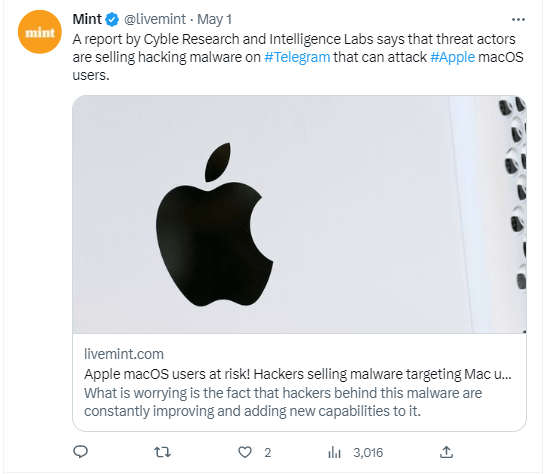High Threat to Apple macOS owners! Hackers marketing malware on Telegram that Targets Mac Users

“The stealer is designed to target multiple browsers and can extract auto-fills, passwords, cookies, wallets, and credit card information. Specifically, AMOS can target crypto wallets such as Electrum, Binance, Exodus, Atomic, and Coinomi,” the statement continues.
Various Cyber criminals are allegedly trading hacking software on Telegram, which can target Apple macOS owners, according to a study conducted by Cyble Research and Intelligence Labs (CRIL). Targeting Mac consumers, the malware has been identified as Atomic macOS Stealer (AMOS).
The fact that the attackers underneath this malware continue to improve and incorporate new features into it is concerning. The most recent malware update, according to the research, was observed on April 25 in a Telegram thread.

In addition, the Atomic macOS Stealer, according to the report, is capable of stealing a variety of data from the computer used by the target, such as keychain passwords, the entirety of the system logs, files from the computer’s desktop, and documents folders, and even the entire macOS password.
“The stealer is designed to target multiple browsers and can extract auto-fills, passwords, cookies, wallets, and credit card information. Specifically, AMOS can target crypto wallets such as Electrum, Binance, Exodus, Atomic, and Coinomi,” the statement continues.
According to the research, the cyber intruders also offer more services via Telegram, including a web panel to handle targets, a meta mask brute-forcing to gather seed and private keys, a crypto checker, and a dmg installer. The cost of these services tends to be around US$1,000 monthly.
With the insights found by the CRIL research, Apple Mac customers who want to protect their Apple macOS laptops and desktop computers from AMOS infection can install an a.dmg file. A false system dialog window that appears after installation allows users to verify their identity for the process of installation with a user password. When the file is installed, it will check for sensitive data, which it may steal using the system password and send to a distant server.
What should Mac users do?
Users of Apple Macs are recommended to take general safety precautions, such as browsing reputable and trustworthy websites. Additionally, real-time malware-blocking tools are suggested to download and install in due time.
Kindly read another article:
Nigerian National from Delhi is Detained by Pune Police for Online Gift Scam
HR Company Notifies of A Data Breach
Alert! Latest Text Scam will gorge you out of your money and data.






